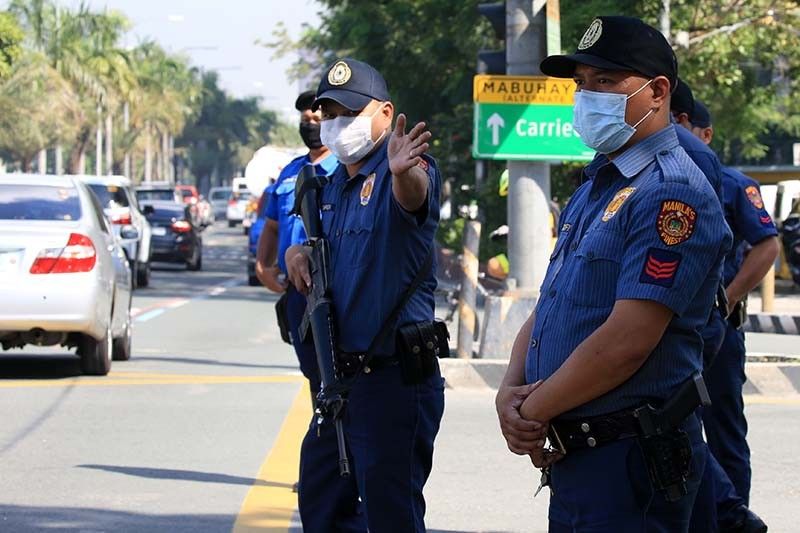Task force looks to 2018 'anti-tambay' campaign for COVID-19 fight

MANILA, Philippines — The quarantine enforcement arm of the government's coronavirus task force is looking at tightening enforcement of local ordinances—including bans on loitering, drinking and smoking—to further clamp down on quarantine violators, it said Sunday.
In a statement issued on Sunday afternoon, Joint Task Force COVID Shield—composed of the national police, military, coast guard, and fire protection bureau—said it "sees discipline-based and local ordinances such as anti-loitering and ban on smoking and drinking session alongside the streets in the communities as an effective tool" to fight the coronavirus.
“On the part of the JTF COVID Shield, we believe that these disciplinary measures using existing local ordinances against these kinds of offenses will reinforce the implementation of our quarantine rules,” said Eleazar.
Eleazar's statement comes after weeks of justifying the deployment of 150 Special Action Force police commandos equipped with drones and armored vehicles—an initiative he earlier insisted was part and parcel of the administration's medical solution against the microscopic pathogen and was a necessary move to curb its spread.
RELATED: Gov't said Filipinos are 'pasaway' and violate quarantine, but data show otherwise | Government banks on 'discipline' as likely shift to GCQ nears | 'War' narrative in COVID-19 crisis fails to empower Filipinos, groups say
But deflecting the blame of lapses in decision making to the public's supposed lack of discipline in following quarantine rules has long been a pattern of behavior among government officials despite data and surveys showing otherwise.
“We believe that we can use this strategy against COVID-19 especially that we have been receiving complaints and observations about some of our kababayan who start to become complacent after some of the quarantine rules were eased,” Eleazar pressed in his most recent statement.
Anti-loitering crackdown
Though the crime volume in Metro Manila went down according to the JTF's figures, reports of abuse against detainees and quarantine violators were plentiful at the onset of the enhanced community quarantine. Some were made to sit in the sun or squeeze into tight cages with other supposed violators, effectively doing away with the very social distancing protocols they allegedly violated.
The alleged breaches of quarantine rules showed shades of President Rodrigo Duterte's 2018 crackdown on loitering in the streets, when some 8,000 people were arrested just for being in public as part of a supposed "crime prevention program."
Most of them did not have formal charges.
Eleazar, who was director of the Metro Manila police office then, said that cops only "accosted" suspects rather than actually arresting them. In his statement Sunday, the PNP deputy chief for operations called the 2018 crackdown "effective in forcing local residents to be disciplined and responsible which eventually resulted in the significant reduction of crime rate in the metropolis."
“Through the intensified police visibility and strategic deployment, coupled with cooperation of barangay enforcers, we were able to impose discipline metrowide which eventually elicited positive results on crime statistics,” he added.
In an earlier statement, Phelim Kine, deputy Asia director for Human Rights Watch said: “The Philippine National Police are again demonstrating their preference for wielding fear, intimidation, and arbitrary arrest to target vulnerable communities rather than respect for the rule of law.
The Philippine government should protect the basic rights of all Filipinos rather than let the police demolish them on the pretext of a ‘crime prevention’ campaign."
Why does this matter?
As it is, warrantless arrests and overzealous law enforcement have already been common over the months-long COVID-19 quarantine, with cops oft citing social distancing reasons when arresting protestors.
RELATED: 11 activists protesting enactment of Anti-Terrorism Law arrested in Cabuyao | Arrests amid pandemic violate government's own health, safety guidelines — CHR
Victims' and witnesses' accounts often paint a picture of aggressively cops who do not read their Miranda rights nor inform them of the charges for their arrest, both part of standard operating procedure that cops are required to do when conducting arrests.
With the signing of the Anti-Terror Bill—which authorizes the warrantless detention of people suspected of being terrorists for up to 24 days without formal charges—the door is left wide open for the same kind of crackdown to happen again if enforcement authorities are indeed looking at "discipline-based" ordinances as a "tool" to detain violators of quarantine rules.
And according to Eleazar, Police Gen. Archie Gamboa, the chief of the PNP, "has already given a go-signal for the strict implementation of the local ordinances through a memorandum."
At the beginning of the enhanced community quarantine, President Rodrigo Duterte warned the public, particularly students, that anybody caught loitering could be arrested.
"I do not want anybody to interfere in your enjoyment. Ayaw ko na masita kayo ng police at military. It could be messy. Itong mga police at military, they have their orders to enforce," he said.
- Latest
- Trending































